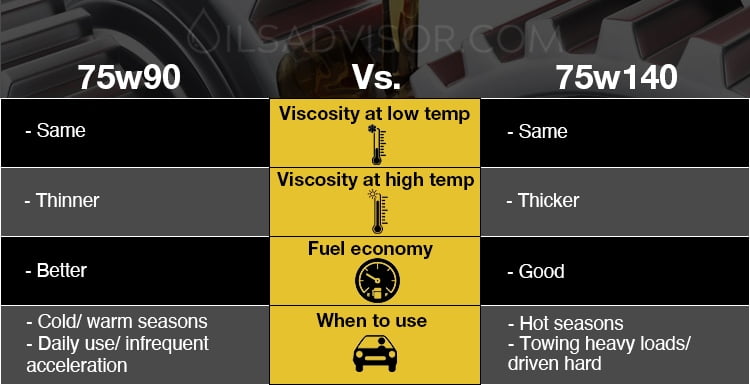
Gear oil keeps your vehicle’s transmission, drive axles, and gears from malfunctioning during everyday use. In disparate conditions, your car requires different gear oil grades.
For instance, you are driving a Ford Mustang. Your car’s manual requires 75w90, but some others advise using 75w140 if you are under hard driving or towing. So, what are the differences between 75w90 and 75w140?
This article compares 75w90 vs 75w140 in terms of viscosity grade, performance, fuel economy, and applications. Also, I’ll walk you through how different grades affect performance in your Mustangs, BMWs, Subaru, and more.
Let’s get started!
75w90 vs 75w140: Key Things in Common
Let’s cut to the chase; the similarity is that 75w90 and 75w140 have the same viscosity at low temp. This means they have the same flow in cold weather and offer the same performance in the low-temperature range.
Gear oils rated at 75W remain fluid at temperatures as low as -40°F/°C as a rule of thumb. The oil isn’t very viscous, has greater shear stability, and can’t withstand heavy loads.
Related: GL4 Vs GL5: Detailed Comparison
75w90 vs 75w140: Underlining the Difference

Viscosity Grade
A 75W-90 is thinner at higher oil temperatures than a 75w140
Recall what I said, the higher the number after W, the thicker your oil will be in hot weather. In other terms, 75w90 is thinner at high temperatures than 75W140. This indicates that 75w140 will do a better job for your car in hot climates.
More than that, the oil rated at 75w90 will lose its viscidity rapidly when the vehicle is subjected to heavier loads generally encountered during hauling operations, back-to-back quick acceleration, and braking, or prolonged use on the freeway. If your driving pattern fits any of these descriptions, your vehicle needs a 75w140 grade gear oil for optimum wear protection and longevity.
Fuel Economy
75w90 provides better fuel economy than 75w140.
This is due to a thinner viscosity grade in high temperatures. One more thing is that the additives and compositions used in the fluid may affect this feature. But gear oil brands do not reveal much information about their additive packages in the lubricants, so we won’t know exactly the result it can bring to the real world.
However, many car owners recognize that the difference in fuel economy is too small to be of any significance. It’s also not noticeable for daily drivers as well.
Application

By now, you must have realized how viscidity works and are informed enough to choose the right gear oil for your vehicle. But to sum things up, I’ve listed the basic differences in application of the fluids.
75w90
The oil works best when the ambient temperature is low since it quickly loses viscosity as the mercury rises. A 75w90 grade gear oil is ideal for winter conditions and passenger vehicles primarily used in daily use or city traffic.
75w140
If your vehicle is used extensively for hauling heavy loads, in hotter climates, or on the racetrack, I recommend using a 75w140 grade gear oil. While the lubricant performs similarly to the 75w90 fluid in the lower temperature range, the higher kinematic viscosity helps it retain viscidity as the mercury soars.
Related: 5w40 Vs 15w40: Detailed Comparison
Compatibility of 75w90 & 75w140 on Some Cars/Models
75w90 Vs 75w140 Mustang
Ford recommends using synthetic gear oil in the Mustang. While earlier models would use a 75w90 fluid, modern Mustangs use 75w140 gear oils since they make a lot more horsepower. Therefore, a viscid fluid lowers the operating temperature quickly, reduces friction between the mechanical parts, and retains its lubricating properties during extensive use.
75w90 Vs 75w140 BMW
BMW recommends using a 75w140 synthetic gear oil. While this is ideal for heavy use, users can switch to a 75w90 oil if their vehicles are primarily used within the city. However, you might need to shorten the draining interval to maximize the life of the mechanical components. Also, I strongly suggest that you stick to OEM recommendations.
75w90 vs 75w140 Subaru
While Subaru recommends using synthetic gear oil in its vehicles, the grade depends on the climate where the vehicle is being driven. The OEM recommendation is 75w90, but users in hot climates can switch to a 75w140 fluid for better performance and longer drain intervals.
Basic Knowledge of Gear Oil

A grade denotes the difference in viscosity across a wide temperature graph. The “W” stands for “winter suitability,” or the flowability of the fluid in colder temperatures. The number before W refers to the viscosity at low temperature. The lower this number is, the thinner your oil will be at low temp. The number after W refers to the viscosity in hot weather. The higher this number is, the thicker your oil will be at high temps.
To further break it down in 75w90 and 75w140, a fluid rated at 75wX reaches 150,000 CP at -40°C/-40°F, which means it lubricates the mechanical components well below the freezing point. Hence, such gear oils are recommended for regions where the ambient temperature is low.
The second number is the fluid kinematic viscosity at 212°F/100°C. Hence, an oil rated at Xw90 has a hot viscosity range between 14 cSt (CentiStokes) and 25 cSt. While the one rated at Xw140 is ranged between 25 cSt and 43 cSt. This means the Xw90 lubricant thins out quicker than an Xw140 oil with the same increase in temperature.
Related: 0W20 Vs 5W20: Detailed Comparison
Final Thoughts
Long story short, a 75w90 grade lubricant is ideal for everyday passenger vehicles. While the 75w140 oil is recommended for pickup trucks that are used for hauling heavy loads or high-performance vehicles that generate higher horsepower.
Moreover, during the winter months, your vehicle needs help lubricating the mechanical components during the cold start. An oil with a lower viscosity as 75w90 range will help prevent mechanical wear. Come summer; you need to switch to a lubricant that can handle the added heat without thinning out or burning off. And that is where a 75w140 rated gear oil comes in handy.
If you enjoyed this blog post, share it with a friend!
Related Reads
- 75W85 or 75W90: Deciphering the Best Gear Oil for You Explore how 75W-90 compares with 75W-140 in terms of viscosity and performance to help you choose the right gear oil – Learn more.
- 75W90 vs 75W140: Detailed Comparison Delve deeper into the differences between 75W-90 and 75W-140, focusing on their specific applications and benefits – Read more.
- Best Oil for 6.0L Powerstroke Discover the best gear oil options for heavy-duty applications like the 6.0L Powerstroke, highlighting when to choose 75W-90 or 75W-140 – Find out more.
- Best Oil For 7.3 Powerstroke Learn about optimal oil choices for the 7.3 Powerstroke engine, considering the role of gear oil in performance – Explore here.
- Lucas Vs Seafoam: Head-To-Head Comparison Compare oil additives like Lucas and Seafoam to see how they work with 75W-90 and 75W-140 gear oils for enhanced performance – Discover now.



Nicely-done summary here, Thanks.
Pingback: 5w30 Vs 10w30: Detailed Comparison - Oils Advisor